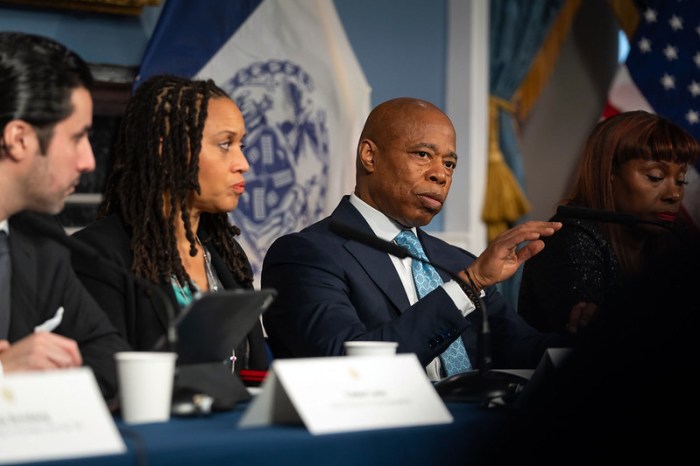Speaking truth to power
To The Editor:
Re “B.R.C., a good neighbor” (editorial, Dec. 1):
The editors of The Villager and Chelsea Now have restored my faith in journalism. Your editorial “BRC, a good neighbor” has, for me, put you among the ranks of “pull no punches” journalists who are willing to speak their minds to power and everybody else. In spite of the prevailing lukewarm acceptance of B.R.C. by the larger community, and the outright rejection of their presence by the newer, mostly younger, richer neighbors, this little neighborhood press has said its piece, unvarnished. My heart swells.
Our elected officials and our community leaders must now take the cue, and a deep drink of reality. This is not the 1990s when the city’s homeless population was at a manageable level, and not in your face at every street corner, subway entrance, under every sidewalk bridge and under your front stoop. The 200-bed limit imposed on shelters made great sense in light of the miserable conditions we allowed to prevail in the warehouses of that era. It might have worked if many more shelters had been established. The logic is fading.
People living on the street have a right, a legal right, to a place to sleep indoors. We have a responsibility, moral and legal, to provide the beds. It’s that simple. In these times is it such a leap to imagine any one of us in their place? Every homeless person once had a home.
We have to recognize that there will be difficulties fitting this population into our lives. It behooves us to do so, unless we prefer to continue stepping over sleeping — or worse — forms on our way to the office.
Thank you, Villager and Chelsea Now.
Pamela Wolff
Déjà vu all over again?
To The Editor:
Re “Going overseas was the only option for our company” (talking point, by John Ottaviano, Dec. 8):
This sort of insight and honesty will never come from the mouths of politicians. Sadly, though, Ottaviano is right that global wages are slowly “balancing out,” and that means U.S. workers will drop out of the so-called middle class in droves — the proverbial “race to the bottom.”
The disparity between the 1 percent and the 99 percent will be much, much larger, and this country cannot and will not function like that for long. The French Revolution was supposed to be a teachable moment, but corporations and politicians of today seem intent on repeating the bloodiest of history lessons.
Shaun Reid
The problem is us!
To The Editor:
Re “Occupy Wall Street: Yes, we are anti-capitalist!” (talking point, by Bill Weinberg, Nov. 17):
Would a different economic system (socialism, communism, uptopianism, etc.?) address: the huge economic disparities; the huge unforeseeable cost of housing; the predatory nature of our society; or the exploitation of workers forced to toil for minimum wage?
Would any “ism” correct our social and economic woes?
When do individual personal responsibility and personal reliance kick in?
What about a person who suffers from a “poverty consciousness”?
Shouldn’t individual initiative, hard work and risk-taking be rewarded?
Is it fair to tax a hard-working person and transfer his hard-earned tax money to someone who is not working (for public assistance, S.S.I. aid to the disabled, food stamps, Medicaid, etc.)?
No matter what economic system we have, no matter what “ism” we use, “We cannot legislate morality,” as Dwight D. Eisenhower said. As long as the values and consciousness of the masses of people are centered on hardened materialism, greed and selfishness, on “the ends justify the means,” then the same economic and social ills will manifest.
Granted, capitalism can be misused and misapplied, but so can any “ism.”
Mr. Weinberg is wrong when he says greed isn’t a moral failing but the governing principle of capitalism. No matter what the economic system, the values and consciousness of the masses will, to a very large degree, determine the economic and social conditions.
Michael Gottlieb
A culinary gay haven
To The Editor:
Re “Fedora Dorato, legendary restaurateur, dies at 91” (obituary, Nov. 24):
Newly arriving in New York nearly 40 years ago, I was taken to Fedora’s by a new flame.
I went back again and again in the ensuing years to this culinary gay haven. I loved the company and the very reasonably priced three-course dinners. Henry at the bar with that cocktail skill and Fedora, the charming incomparable hostess. They and their restaurant were a Village legend.
Tim Hughes
Keep up the great work!
To The Editor:
Re “Fighting for landmarking, safe streets, local shops”; “Gains and losses in battles for historic buildings”; and “After years of work, results on important projects” (Progress Report articles, Dec. 8):
I am standing, applauding Kurt Cavanaugh and the East Village Community Coalition, the Greenwich Village Society for Historic Preservation, Community Board 3 and New York City for all they do to keep our neighborhood the way it has been for nearly 200 years — a beautiful, tree-lined, historical masterpiece of rare beauty not seen elsewhere anywhere in America. The tenement buildings, the parks, alleys, the street, the rich history, should be preserved and enjoyed for generations to come!
Shawn Chittle
Tutors learn a lot, too
To The Editor:
Re “Tutors are making a difference in children’s lives” (Progress Report article, Dec. 8):
My daughter is an N.Y.U. grad student working in the America Reads / America Counts program. To hear her talk with enthusiasm about the students with whom she works is amazing considering she never was interested in teaching before this experience.
Being from Los Angeles, this program has helped her to appreciate New York public education and the city of New York. She now knows her way around the city.
I am appreciative of her experience and the wonderful teaching professionals, parents and students with whom she has been in contact.
Bev Van Citters
Building relationships
To The Editor:
Re “Tutors are making a difference in children’s lives” (Progress Report article, Dec. 8):
It’s interesting to know some students get interested in the teaching profession after helping tutor young children. Indeed, one-on-one tutoring enables tutors to build rich interpersonal relationships with the tutees and provide guidance that fits each student’s learning style. It’s a great complement to teaching in a classroom setting.
Sidik Ahmad
Realtors for a hospital
To The Editor:
We encourage all New York real estate brokers and agents who market residential and commercial properties on Manhattan’s West Side to be in the forefront of advocating for a full-service hospital with a full emergency room for the West Side. We believe it is in your enlightened self-interest to do so.
Since the closing of St. Vincent’s Hospital last year, the West Side has been without a hospital and emergency room. There are now zero hospital beds on the West Side below 57th St., with two beds proposed in the new North Shore-L.I.J. Center for Comprehensive Care. What is wrong with this picture?
You, your clients and the people who live, work and visit the West Side must endure lengthy travel times in heavy cross-town traffic to get to one of the hospitals on First Ave. when suffering life-threatening medical emergencies.
Your clients are your lifeblood and their well-being is paramount to your financial success, to your firms’ reputations and to your own moral satisfaction at a “a job well done.” Use your industry’s considerable clout to assure that people who buy your properties in the beautiful streets of the West Village and Tribeca have the same ready access to a full-service hospital and emergency room that we had before St. Vincent’s closed.
Elizabeth Ryan
E-mail letters, not longer than 250 words in length, to news@thevillager.com or fax to 212-229-2790 or mail to The Villager, Letters to the Editor, 515 Canal St., Suite 1C, NY, NY 10013. Please include phone number for confirmation purposes. The Villager reserves the right to edit letters for space, grammar, clarity and libel. The Villager does not publish anonymous letters.


















